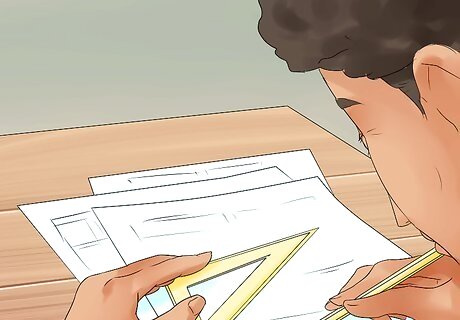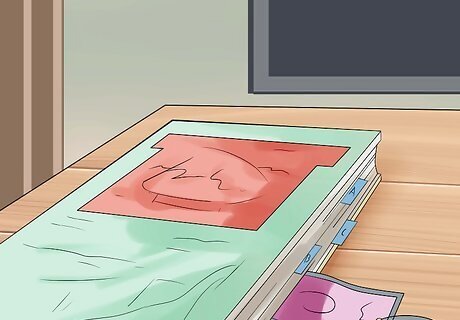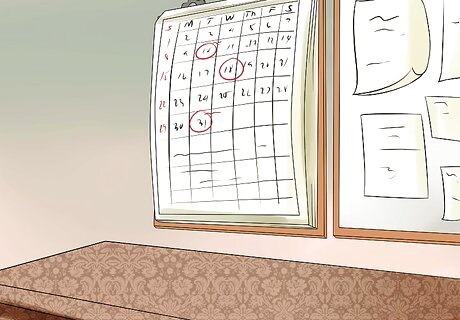
views
Organizing Your Daily Life

Have a morning routine. A great way to stay organized is to have the same routine every morning. This way, you’ll be able to remember things that you’re missing because you will have your routine memorized. It is harder to forget things at home or come to school unprepared if you do the same routine each morning. In addition to showering and getting dressed, your morning routine should include a healthy breakfast and a quick check of the contents of your backpack to make sure you have everything you need. You may even want to gather your things the night before to help your morning run more smoothly. For example, you could pack your lunch, put your things in your backpack, and lay out your clothes.

Begin projects as soon as you get the assignment. Rather than waiting until the night before an assignment is due, try to begin working on homework and other projects as soon as you know what the assignment will be. Waiting until the last minute to complete homework assignments will make you feel less organized and will make it harder to organize other aspects of your student life. Organizing your life to include time for homework every night will help you stay on top of your schoolwork more effectively. If you don’t want to start a project right away, write it down in a planner to remind yourself to work on it.

Color code your materials by subject. This means for Math, you might want to have a blue book cover, blue folder, and blue notebook. For History, you might want to have a pink book cover, pink folder, and pink notebook. You could also use a large color-coded notebook. That way, you'll look in your locker or backpack and easily be able to get what you need for each class. Organizing your school supplies by color coding will help save you time and help you keep all of the things you need grouped together in a way that makes sense to you. EXPERT TIP Alicia Oglesby Alicia Oglesby Professional School Counselor Alicia Oglesby is a Professional School Counselor and the Director of School and College Counseling at Bishop McNamara High School outside of Washington DC. With over ten years of experience in counseling, Alicia specializes in academic advising, social-emotional skills, and career counseling. Alicia holds a BS in Psychology from Howard University and a Master’s in Clinical Counseling and Applied Psychology from Chestnut Hill College. She also studied Race and Mental Health at Virginia Tech. Alicia holds Professional School Counseling Certifications in both Washington DC and Pennsylvania. She has created a college counseling program in its entirety and developed five programs focused on application workshops, parent information workshops, essay writing collaborative, peer-reviewed application activities, and financial aid literacy events. Alicia Oglesby Alicia Oglesby Professional School Counselor Set up systems for organizing schoolwork. Use colored pens to code school subjects in planners and matching folders. Set phone alerts for tests, projects, and assignments, so you stay on top of work. Handwrite to-do lists by due date and class to help retain the information.
Gathering the Necessary Supplies

Buy a large backpack. A backpack is a necessity for any organized student. You are probably not going to be able to fit everything into your locker, especially once you are out of elementary school. Having a big backpack will ensure that everything you need is with you at all times. A large backpack will help you bring all of the things you need to class every day. A big part of being organized is having the supplies you need at each class every day.

Have an agenda. Most schools provide these, but don't worry if your school doesn't. They are really cheap to buy on your own and fairly easy to find. After each class, write down every piece of homework for that class. At the end of the day, you should have all of your homework written down in the agenda. You should be able to find a school agenda book at any office supply store. Most grocery stores and supermarkets sell them as well.

Purchase other supplies. You’ll need to buy some other things to help you become an organized student. There are products and school supplies specifically designed for making organization more manageable. Purchase some folders, binder clips, pens, pencils, and a big trapper keeper. Try to get supplies that are various colors so that all of your things don’t look the same. This will help you pick out what you need in the short periods between classes when you don’t have much time.

Make a supply list for each class. You need to come to class prepared every day. This means that you need to keep track of the things you’ll need to bring with you every day. Make a list the night before and write every single thing you need to bring to each class the next day. Talk to your friends and teachers to know what you need for each class. This is especially helpful for students who have A/B or block schedules with different classes on different days. You don’t want to leave some necessary supplies at home just because you forgot which classes you had that day. Figure out how to lighten your load. Don't bring nonsense things – like a calculator to History or an eraser to P.E.
Setting a Study Schedule

Know when projects are due. Keeping due dates in mind is essential if you want to be an organized, successful student. You may want to purchase a white board or cork-board to write or pin on when projects are due. This will help you create a visual aid for yourself to help you remember deadlines. A fun way to get the project done easier and faster is to work with friends, if your teacher and parents allow that.

Prioritize your to-do list. In order to be an organized student, you need to prioritize the things you need to get done on a daily basis. Make a list of the things you need to do each day, with the most important items at the top of the list so that you know to work on these items first. As you work down the list, you’ll still be accomplishing your goals. But you’ll be doing it in a methodical, organized manner. Figure out when you are naturally the most productive and try to do the bulk of your work during that time. If you are more alert and engaged in the mornings, then try to get up before school and spend some time on homework then. If late at night is your thing, try to create a schedule that allows you to stay up later to work on school assignments. However, keep in mind that some days your productivity will be better at different times of day. EXPERT TIP Bryce Warwick, JD Bryce Warwick, JD Test Prep Tutor, Warwick Strategies Bryce Warwick is currently the President of Warwick Strategies, an organization based in the San Francisco Bay Area offering premium, personalized private tutoring for the GMAT, LSAT and GRE. Bryce has a JD from the George Washington University Law School. Bryce Warwick, JD Bryce Warwick, JD Test Prep Tutor, Warwick Strategies Increase your study time by practicing good habits. Before you set an ambitious study schedule, decide how much studying you think you can do. Then, cut that number in half and make that your goal for the first week or two. Try to hit your target most days of the week and then increase your study time when you feel confident in your habit and skills.

Ask your teachers for help with your study schedule. Don't be afraid to ask teachers for help setting up a study schedule, or even if you don't understand what to do in class. They are there to help you and offer you advice. If you are struggling with completing or organizing your schoolwork, stay after class and discuss it with a teacher you are comfortable talking to. Your teachers can be your best ally and source of knowledge when it comes to academic matters. Don’t be shy about discussing your struggles with them.


















Comments
0 comment